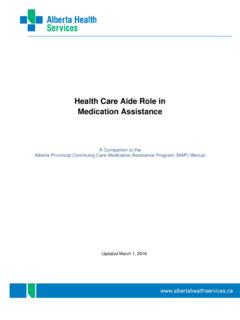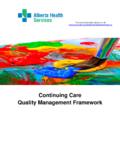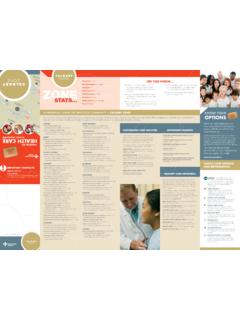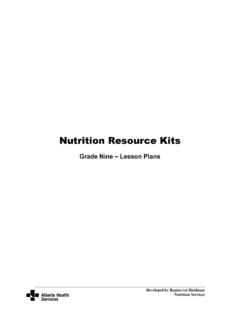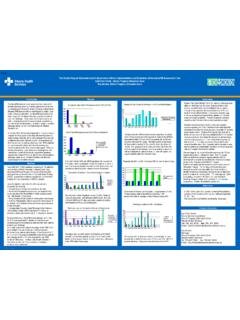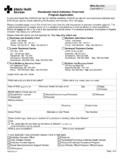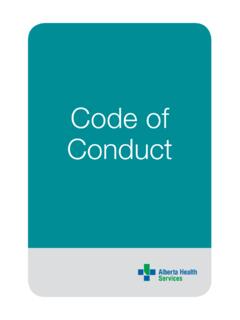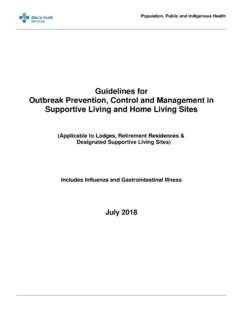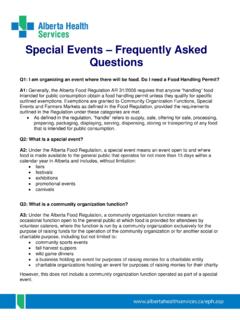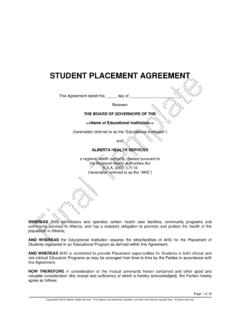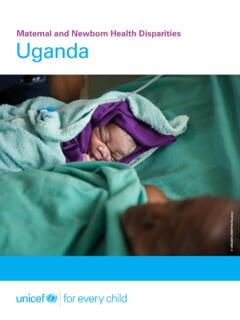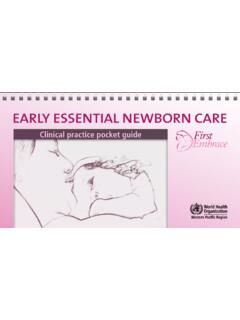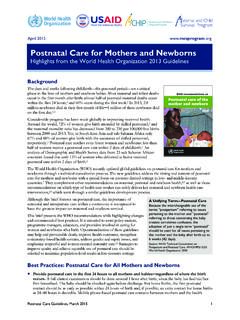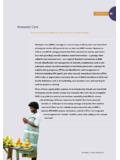Transcription of COVID-19 Prenatal Postnatal - Home | Alberta Health Services
1 COVID-19 and Pregnancy, Birth, Postpartum, and Breastfeeding: Information for Expectant and New Parents For more information, contact Last Update: 09/16/2021 1250h ECC Approved: 09/16/2021 1632h Information is continually being reviewed and updated. The information below may change as our knowledge of COVID-19 evolves. Having a baby is a joyful, momentous time in your life. COVID-19 doesn t change that, but it may have changed your plans, your ability to connect with family and friends, and your experience of pregnancy and first few months with your baby. Pay attention to your feelings and talk to your partner or someone you trust about them. To learn more about what you can do for yourself in tough times like these and where to get help, visit Click to be taken directly to a question: Protecting myself and my family 1. Where can I find trusted, up-to-date information on COVID-19 ?
2 2. UPDATED Where can I find information about the vaccine for COVID-19 ? 3. UPDATED I am an expectant or new parent, is there anything I can do to avoid getting infected with COVID-19 ? 4. I am an expectant or new parent, should I wear a non-medical mask to avoid being infected with COVID-19 ? 5. UPDATED I am an expectant or new parent, how can I protect myself and baby if any of my household members are symptomatic, in isolation or tested positive for COVID-19 ? 6. Will my physician know if I m being tested for COVID-19 or have a positive test result? Pregnancy ( Prenatal ) 7. UPDATED I am pregnant and I am worried about getting infected with COVID-19 . How will COVID-19 affect me and my baby? 8. If I think I already have the COVID-19 infection, what should I do? 9. I m pregnant and feeling healthy. Should I still go to my Prenatal appointments? Labour and birth 10. UPDATED Can my support person still be with me during labour and birth in the hospital?
3 Can my family and friends visit me and my baby at the hospital? 11. What will happen when I am in labour during the COVID-19 pandemic? 12. Do I need to wear a mask during labour at an AHS facility? Postpartum 13. Do I need to wear a mask on the Postpartum Unit? Does my support person need to wear a mask on the Postpartum Unit? 14. UPDATED What will happen when I am discharged from the hospital? Information for Expectant and New Parents: COVID-19 | 2 15. If I am experiencing symptoms, have been tested positive for COVID-19 , or need to isolate, can I still have skin-to-skin contact with my baby after delivery? Feeding my baby General feeding information 16. How can I feed my baby safely during the COVID-19 pandemic? 17. UPDATED Should I wear a mask while feeding my baby? Breastfeeding 18. UPDATED If I have COVID-19 and still need to isolate due to symptoms or illness, will I still be able to breastfeed and express breastmilk for my baby?
4 Feeding by bottle 19. If I have COVID-19 , will I still be able to feed my baby by bottle? 20. Is there anything I need to know if I usually feed my baby formula? Caring for my baby 21. UPDATED If I have COVID-19 , will I still be able to care for my baby? 22. If my COVID-19 swab is positive, will my baby have the illness too? 23. What are some signs that my baby may be unwell? 24. Where can I find more information about pregnancy, birth, breastfeeding, postpartum supports, and caring for my new baby? Information for Expectant and New Parents: COVID-19 | 3 Protecting myself and my family 1. Where can I find trusted, up-to-date information on COVID-19 ? Visit or for trusted, Alberta -specific information about COVID-19 , including the new variants. Frequently asked questions for the public can be found here. In addition, a podcast featuring Dr. Colin Birch, Department Head of Obstetrics and Gynecology for Calgary Zone, with questions about the impact of COVID-19 on expectant mothers and families of newborns is available at 2.
5 UPDATED Where can I find information about the vaccine for COVID-19 ? Learn more about the vaccine and immunization program at: COVID-19 vaccine is recommended for everyone 12 years of age and older, including people who are trying to get pregnant now or might become pregnant in the future, and their partners. It is best to get an mRNA COVID-19 vaccine if you are pregnant or planning to get pregnant. Research to date shows that it is the safest type of COVID-19 vaccine to get during pregnancy. If you get pregnant after receiving your first shot of COVID-19 vaccine, make sure to get your second shot to get as much protection as possible. COVID-19 immunization is also safe if you are breastfeeding and expressing breastmilk for your baby. If you are pregnant or breastfeeding and have questions about the vaccine you can talk to your Health care provider, but this is not required before being immunized.
6 Learn more about vaccine in pregnancy here. 3. UPDATED I am an expectant or new parent. Is there anything I can do to avoid getting infected with COVID-19 ? It is always important for expectant parents, new parents, and breastfeeding families to protect themselves from illness and to take steps to avoid and prevent any infection. Learn more at While several treatments are currently being investigated, there is currently no specific treatment for COVID-19 . Preventing COVID-19 is your best protection. The best way to protect yourself is to get immunized, follow public Health guidance, and assess and manage your personal risk. Following these steps can help reduce your risk of COVID-19 infection or spreading to others: Proper hygiene: Stay home and away from others if you are sick. Information for Expectant and New Parents: COVID-19 | 4 Wash your hands often with soap and water for at least 20 seconds.
7 Use alcohol-based hand sanitizer if your hands are not visibly dirty and if soap and water are not available. Cough or sneeze into a tissue or your elbow, not into your hand. Dispose of tissues as soon as possible and wash your hands afterward. Avoid touching your eyes, face, nose, or mouth with unwashed hands. Avoid close contact with people who are sick. Clean and disinfect surfaces that are touched frequently ( , door handles, phones, television remotes, toilets, bedside tables). Physical distancing (taking steps to limit the number of people you or your baby come into close contact with): Keep a distance of at least 2 metres (6 feet) from others. This includes, for example, when you go for walks in your neighbourhood or park, in your workplace, when you go out for groceries or medical trips, etc. Limit the number of times you leave your home for errands. Consider ordering online or having items delivered, if possible, and maintain 2 metres distance from others.
8 If you need to go out for groceries, medical trips, or other essential needs, try to go out at less busy times. Work from home, if possible. Follow Alberta s recommendations on gatherings. Avoid overcrowding in places like elevators limit to 2-3 people. Stay in virtual contact with family and friends. If you are feeling isolated, reach out. Avoid close contact with people who have COVID-19 symptoms (fever, cough, shortness of breath, difficulty breathing, sore throat or runny nose) or are sick with other cold or flu-like symptoms. To learn more about how to help prevent the spread, see 4. I am an expectant or new parent. Should I wear a non-medical mask to avoid being infected with COVID-19 ? Wearing a mask is required in most settings as part of public Health measures. Visit for the most up-to-date guidelines. Wearing a non-medical mask, such as a homemade cloth mask, has not been proven to protect the person wearing it and is not a substitute for handwashing and physical distancing.
9 However, wearing a non-medical mask may be helpful in protecting others around you. This is because face coverings are another way to cover your mouth and nose to prevent respiratory droplets from contaminating other people or surfaces. Additionally, wearing a mask may stop you from touching your nose and mouth. Information for Expectant and New Parents: COVID-19 | 5 If you have COVID-19 or are feeling unwell, wear a mask while providing direct care to your infant. When not providing direct care , keep your baby at least 2 metres (6 feet) away from you and from anyone who is sick, may have COVID-19 , or who has a respiratory illness. If you choose to wear a non-medical mask or face covering due to illness, there are steps that you must follow to ensure that you are using it correctly. If you are using a face mask: Ensure that it fits well and does not gape at the sides. Wash your hands with soap and water before putting on the mask and after removing the mask.
10 Do not touch the mask while using it. If you accidentally touch the mask while you are using it, wash your hands. Replace the mask if it gets damp or dirty. Do not reuse single-use masks. Do not share masks with others. Used masks must be carefully handled to avoid spreading infection to others. It may be helpful to carry a bag with a clean mask in it, as well as a plastic bag that can be used to safely store used masks until they can be washed at home (if using cloth masks) or thrown away (if using disposal masks). Wash reusable cloth masks after each use to avoid infection. They can be laundered with other items using a hot cycle and then dried thoroughly. Learn more about masks at 5. UPDATED I am an expectant or new parent. How can I protect myself and baby if any of my household members are symptomatic, in isolation or tested positive for COVID-19 ? The best way to protect yourself is to get immunized, follow public Health guidance, and assess and manage your personal risk.
